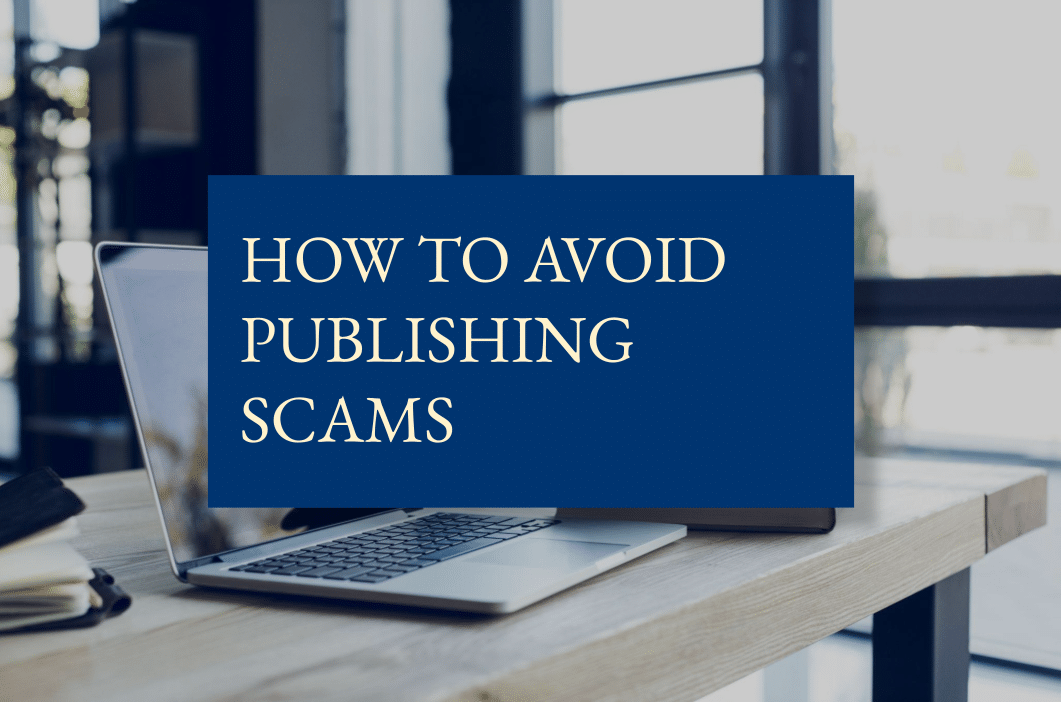
You know the old adage, “if it seems too good to be true, it probably is”? Nowhere is this more true than in the Wild West world of publishing scams. The sad truth is that when enough people want something — in this case, to see the book they’ve worked so hard for on the shelves and in the hands of readers — there will be unscrupulous people waiting to take advantage of those dreams.
Publishing scams are evolving all the time. The best defence is to keep yourself informed and diligent when dealing with industry professionals. Here are some important things to keep in mind when you start pursuing that book deal.
Types of publishing scams
Unfortunately, publishing scams can wear many faces. These are a few of the most prolific.
Representation scams
Representation scams happen when a dishonest literary agent, or someone posing as a literary agent, offers to represent you. This can feel exciting until you start to notice that things don’t quite add up.
These scammers will often call you up out of the blue and tell you how much they loved your book (which they haven’t read) and offer to represent you. But there’s a catch — you first have to pay a reading fee, or an editorial fee, or a marketing package fee, or some necessary add-on service to make the book a success.
It’s important to remember that agents don’t make money until you make money. Their livelihoods are a commission, normally around 15%, off the payments a publisher makes for your book. So if a publisher offers you a $1,000 advance, your agent will keep $150 and you’ll keep the other $850. If the agent is asking for you to pay them anything, something’s not right.
Vanity press scams
A vanity press is a self-publishing service that masquerades as a traditional publisher. They prey on new, inexperienced authors who don’t yet realise that writing is a job — you, the writer, are offering a service. A vanity press will offer a contract for the publication of your book, but charge you a premium for things like editing, cover design, and promotion.
Traditional publishers pay authors, not the other way around. An author is essentially a type of freelance contractor; they’re doing work (writing the book) for a client (the publisher) for an agreed payment plan — usually a small advance and then a percentage of all future sales. Vanity presses try to convince the inexperienced writer that they, the publisher, are the ones offering the coveted service.
Marketing scams
In the age of social media influencers, everyone wants to be a viral hit. Marketing scammers will reach out to new writers and offer them complex promotion packages that guarantee a certain number of followers or views. Or they’ll offer a glowing review and promo feature in a magazine that no one you know has ever heard of for a super exclusive limited time discount just for you.
Marketing scammers know that engagement translates into sales, and they’re counting on the writer being a little overwhelmed by the whole promotional process (we’re known to be an introverted lot, after all).
Bookshop scams
Everyone wants to see their book on the shelf of their local haunt. How books actually get there can be a bit of a mystery, which scammers are more than happy to take advantage of. Bookshop scams can include registration for a “book license” that allows your book to be sold in stores (such licensing doesn’t exist), or insurance against returns so that if readers return your book to a shop, you don’t lose any income (another non-existent promise).
Because these things sound vaguely plausible, it’s easy to sell them to inexperienced writers desperate for approval.
Film rights scams
Picture this: Netflix buys the rights to your novel and hires their best senior screenwriter to adapt it for television. Your favourite actress has already been cast in the lead role, and they’re sure it’s going to become the next cult classic. Sounds pretty good, doesn’t it? Unfortunately, the book-to-film journey is a little more complicated.
Fake film rights “book scouts” will often throw around empty promises of fame and acclaim, as well as things that sound connected but aren’t. For example, they may ask for a fee to have a celebrated screenwriter write a script adaptation of your book. However, even having a great script is no guarantee of production. These scammers usually take the writer’s money and are never heard from again.
Join our email list for authors
Join our email list for content and opportunities to help you develop your writing, promote your books, and build your author business.
How to avoid falling prey to scammy scammers
This may sound scary, but we hope it won’t put you off seeking publication for your novel! To avoid the pitfalls of publishing scams, follow these key tips.
Do your homework
We live in an age where there’s nowhere to hide. Always, always Google search the name or company that you’re dealing with to get a sense of how reputable they are. They should have a professional looking website that’s written in native English (or your target language) and free of typos and grammatical errors.
See who else this person has worked with. If they list an author as one of their clients, don’t be afraid to reach out to that author and ask if they’d be willing to share their experience. Run a search for the name or company on WriterBeware, a literary “watchdog” that keeps up-to-date records of all running publishing scams. The Alliance of Independent Authors also keeps a list of reputable and disreputable companies. Finally, add “Reddit” to your Google search to see if any conversations have been opened between other writers that have been scammed.
Establish the target audience
When you find the website or social media profile for the person you’re researching, consider who this person is trying to reach. If it’s a publisher, it should be pretty clear that their site is all about attracting readers to buy their books: “Autumn new releases! Special Labour Day flash sale! Now available for pre-order!”. If the website is geared towards you — “Make your publishing dreams come true! Become a New York Times bestseller! Higher-than-standard royalties!” — do not pass go, do not collect two hundred.
Be very wary of aggressive marketing tactics and false promises that pressure you to fork over your hard-earned cash.
Shackle your pride
Savvy scammers know that validation is a weapon. Every aspiring author wants to hear that their book is really something special. Many a writer has fallen for a scam that they knew, deep down, wasn’t quite right… but having someone tell them everything they needed to hear was too addictive to resist. Be mindful of letting your ego call the shots.
Ask questions
If a publisher, literary agent, or film scout tells you that they loved your work and thought it showed incredible promise, it’s pretty easy to poke holes in their lies until they fall apart. Ask them what it was about the book they thought really stood out (“The characters.” “Which character?” “The main character.” “At what point in the story did you start investing in the main character?” “Right away.” “And what was it about the opening scene that made you feel that way?”).
Ask for help
Finally, remember that you’re not in this alone. One of the best things you can do when you’re beginning to look at contracts is join a writers union. Here are the writers unions for the major English-speaking countries:
The United Kingdom (including Scotland and Wales): The Society of Authors
The United States: The Author’s Guild
Canada: The Canadian Authors Association
Ireland: The Irish Writers’ Union
Australia: The Australian Society of Authors
All of these organisations will review contracts, emails, or even instant messages and help you flag any warning signs of a scam. WriterBeware, which we linked above, also offers advice and support for authors navigating unscrupulous deals.
Fija Callaghan is an author, poet, and unapologetic daydreamer. Her work has been shortlisted and longlisted for a number of short story prizes, and you can find her writing in publications like Gingerbread House, Crow & Cross Keys, Corvid Queen, and Mythic Magazine. When not writing or helping other writers get the best out of their work, she can be found haunting her local bookshops or watching the tide come in.
Join our email list for authors
Join our email list for content and opportunities to help you develop your writing, promote your books, and build your author business.
